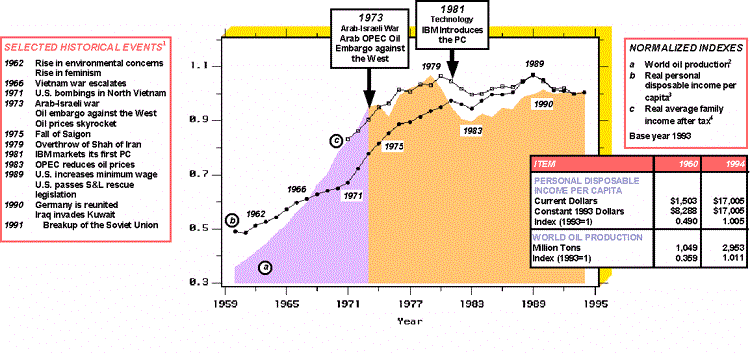|
|
||||||||||||||
|
CHAPTER 7 The Wicked Truth About the New Economy
Despite massive advances in technology, the real average family income has been essentially stagnant since 1973. Why? Is it because the marketplace substituted cheap technology for humans? Technology has been used by Big Money to increase productivity or to eliminate jobs -- and not necessarily to create wealth for citizens. People can now produce slick reports on their personal computers -- but most cannot find good stable jobs! Many have discovered that loyalty is no longer reciprocated: what many bosses want is flexible servitude, not loyalty. Obey, or lose your job! Even governments are threatened -- obey, or we'll move the factory to a lower-tax jurisdiction! The marketplace economy has become a command economy. Economic policies amount to dirigisme by monopolists acting as para-governments.1 That's the ugly reality of the so-called new economy. Robots. Today, a large corporation can record the motions of its best factory worker on computers, then replay them through Robots to produce the goods it sells. Would such a corporation keep the worker on its payroll, as a full-time employee? Probably not. Hayek told us that prices (the worker's salary) reflect the "value" of the worker's work -- not his "merit"!2 And herein lies the dilemma of the marketplace. The dehired worker, whose perfected Art and Science has been captured by the Capitalist's Machine for all time, can go to hell. After all, the worker was informed that his motions would be recorded on the computer! And, nobody coerced him into helping the company increase its efficiency or productivity! So long as there are enough consumers for their products and services, should the lords of the marketplace care? In America By Design, David F. Noble explained how corporations monopolize technological intelligence.3 He argued as follows. Monopolists first take control of "the products of scientific technology," then extend their control to include "the process of scientific production itself."4 The monopolist ends up controlling both product and process. Noble noted that it was Charles Babbage, a British engineer and "capitalist theoretician," who first understood the necessity for the capitalist to "dissociate labor from the productive process and reintegrate the two . . . to maximize the surplus value produced by the labor force in the productive process"5 -- for the benefit of the Capitalist. In other words, the key to the Capitalist's prosperity is first to divorce the workers "form ownership of the means of productive work," then to "divorce [them] from their own skill, their own traditional store of knowledge . . ."6 Noble's insight can be generalized. There is no reason to believe that the monopolist would not extend his control to include all -- product, process of production, and science and technology! Babbage's Principle of Capitalist Monopolization and Control. Today, bank public relations and propaganda tell us that banks care about innovation and entrepreneurs. Consider this gedanken scenario. A scientist or engineer discovers how to produce inexpensively a portable, ecologically sound, nuclear power supply with a lifetime exceeding 100 years! Not having sufficient capital, he negotiates a deal with the venture capital arm of his bank. He gets capital, the bank gets equity stock -- equity control -- in the innovator's company. With good planning, sufficient capital, and luck, the company starts growing exponentially. Now here's the dilemma. The banker used essentially other people's money -- investors' and depositors' money -- to finance the venture. If he is a true Capitalist, his first instinct would be to take control and monopolize the very science that is used in the production process for the power supply. How can the banker achieve his goal? Simple. He waits for the first opportunity to "divorce" the scientist from his science and technology . . .
|
|
| 1
For a discussion of "coalitions of organized interests" and
"para-governments," see Friedrich A. Hayek, Law, Legislation and Liberty,
Vol. 2, 1976, at 13-17 and 143-145. 2 Ibid., Vol. 2, at 131 (discrepancy between merit from effort and corresponding benefit).3 See David F. Noble, America by Design, 1977, at 259-260 ("capitalist monopolization of the intelligence of, and control over, production . . . ").4 Ibid., at 6 (monopolist control over the products and the process of scientific production).5 Ibid., at 259 (Charles Babbage).6 David F. Noble, America by Design, 1977, at 267. |
| ECONOMIC STAGNATION THE LINK BETWEEN INCOME AND WORLD OIL PRODUCTION |
||
|
